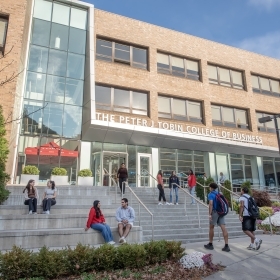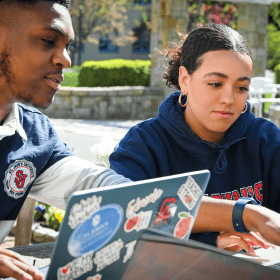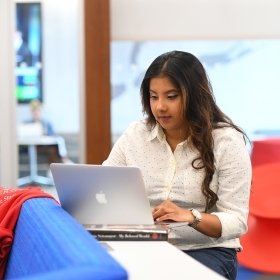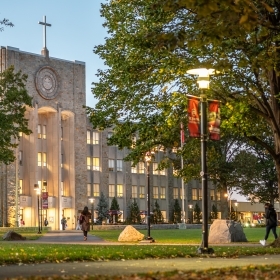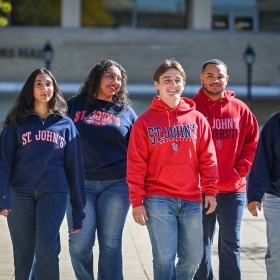Undergraduate Research: Why You Should Get Involved

You don’t have to wait until graduate school to start your research journey. Undergraduate research offers you the opportunity to explore the subjects that inspire you; work alongside faculty who are experts in their fields; and apply what you’re learning in meaningful, real-world ways.
In this blog, you learn more about what undergraduate research is, what it looks like in practice, and how it can shape your college journey.
What Is Undergraduate Research?
Undergraduate research is a chance to go beyond the classroom. It’s an opportunity to collaborate with faculty on a project, investigate a topic that excites you, and build real-world experience that makes a difference—both during and after college.
“Participating in research allows students to dive deep into a specific field,” says Dr. Xue Mei, Associate Professor of Biological Sciences at St. John's College of Liberal Arts and Sciences. “While coursework introduces students to certain topics, research allows them to learn them in depth and apply concepts in research settings.”
What Does Undergraduate Research Look Like?
When you hear “research,” it’s easy to picture white lab coats, microscopes, and scientific formulas—and yes, those are part of the picture. But at St. John’s University, research opportunities go far beyond the lab.
No matter your major or interests, there’s a way to dive deeper into the topics that excite you.
Here are a few examples of what undergraduate research can look like across disciplines:
Social Sciences and Humanities
Interested in people, culture, or society? You might conduct interviews to study how young adults engage with social media, analyze historical documents to uncover untold stories, or examine how language shapes identity.
Business and Economics
If you’re business-minded, you might explore consumer behavior by analyzing survey data, studying how economic trends affect communities, or evaluating the marketing strategy of a start-up.
Creative Arts and Media
You might explore how visual design influences political messaging, investigate music and pop culture trends, or analyze audience responses to film or social media campaigns.
The takeaway: Research is for everyone. It’s about curiosity, exploration, and asking thoughtful questions—whatever field you’re in.
The Benefits of Participating in Research Opportunities
Build Career-Ready Skills
Participating in research helps expand knowledge and develop skills that graduate schools or workplaces value, such as critical thinking, problem solving, and effective communication.
“When students learn to ask questions, design experiments, or analyze data, they gain critical thinking skills,” says Dr. Mei. “Very often in science research, they encounter setbacks, through which they develop problem-solving skills and learn to be resilient. The research experience within a small group is also a professional environment, where students network with colleagues from different backgrounds.”
In addition, these hands-on experiences can also translate into stronger academic performance.
According to a 2023 study, “The Impact of Undergraduate Research Experience Intensity on Measures of Student Success" (PDF), students with more extensive research experience graduate with higher grade point averages, complete their degrees faster, and are more likely to pursue graduate education than those with limited or no research involvement.
“Several students have told me that working on research in the lab helps them a lot when they take the genetics course (which I teach),” says Dr. Mei. “I have also seen those ‘aha’ moments when the students connect the dots between what we do in the lab and what they have learned in class. That connection between coursework, real-world application, and future goals makes undergraduate research a transformative experience.”
Student Researcher Success
What does undergraduate research success look like in practice? Just ask Noah Dickison, Hayley Smith, and David J. Anderson—three exceptional student researchers at St. John’s University whose commitment to investigating intricate subjects has brought them prestigious accolades at the annual Student Research Conference.
- Noah Dickison, a biology major, investigates fertilization using Caenorhabditis elegans and CRISPR-based gene-editing tools. He joined Dr. Mei’s lab in the Department of Biological Sciences after reaching out via email to express interest in her work.
- Hayley Smith, a speech-language pathology and audiology major, conducts EEG-based research exploring how the brain anticipates and processes speech. She first discovered Monica Wagner, Ph.D’s lab through a student club event and quickly got involved. Dr. Wagner is an Associate Professor in the Department of Communication Sciences and Disorders in St. John’s College of Liberal Arts and Sciences
- David J. Anderson, also a biology major, focuses on the purification and expression of recombinant Sortase A from E. coli. He began his research journey through the First-Year Research Opportunity (FYRO), working alongside Shanzhi Wang, Ph.D. Associate Professor, Department of Pharmaceutical Sciences in the College of Pharmacy and Health Sciences
Each student discovered personalized ways to connect with faculty, engage in hands-on lab work, and build confidence in presenting their findings to a wider academic audience.
Read the full Q&A blog post, What Is It Like to Be an Undergraduate Student Researcher?
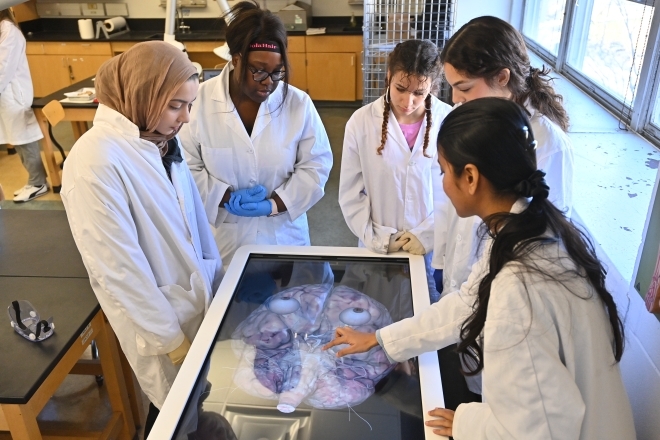
Gain Meaningful Research Experience
Research can look different for every student, but no matter your major, it’s one of the most powerful ways to take your education into your own hands. At St. John’s University, students can start exploring, ask big questions, and build their future.


